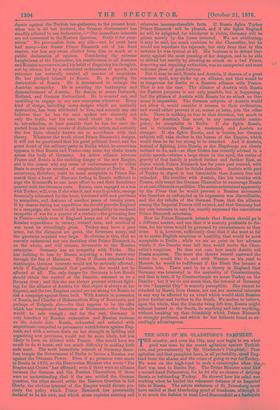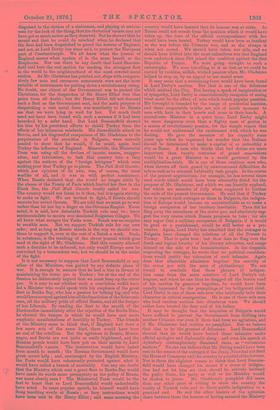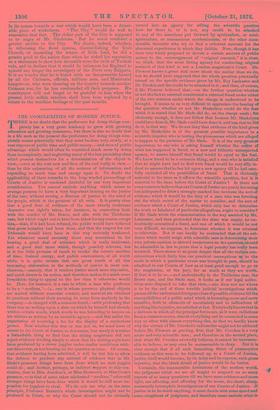THE GOOD OF MR. GLADSTONE'S PAMPHLET. T HE country, and even
the City, may now begin to see what good was done by the recent agitation against Turkish rule, and pre-eminently by Mr. Gladstone's Pamphlet. That agitation and that pamphlet have, in all probability, saved Eng- land from the shame and the crime of going to war for Turkey. We were on the high-road to such a catastrophe when the.,..-; fleet was sent to Besika Bay. The Prime Minister acted like a second-hand Palmerston, for he let slip no chance of defying Russia or befriending Turkey. He showed how his mind was working when he hurled the vehement defiance of an Imperial title at Russia. The astute statesmen of St. Petersburg must have smiled at that blundering spurt of frankness, although it is so much the fashion to treat Lord Beaconsfield as a harlequin disguised in the clothes of a statesman, and playing at serious- ness for the look of the thing, that his rhetorical vaunts may not have got so much notice as they deserved. But he showed that he meant and that he could do mischief when he declared that the fleet had been despatched to guard the honour of England, and not, as Lord Derby has since said, to protect the European part of Constantinople. We all know what the honour of England means when spoken of in the same breath as the Bosphorus. Nor can there be any doubt that Lord Beacons- field laid bare the real motive for sending the strongest fleet in the world to the neighbourhood of the most coveted naval station. As Mr. Gladstone has pointed out, ships with compara- tively few men and enormous armaments were not the most suitable of instruments for putting down a revolutionary rising. No doubt, one object of the Government was to protect the bhristians, for the despatches of Sir Henry Elliot free that point from all doubt ; but Sir Henry Elliot did not demand such a fleet as the Government sent, and the main purpose of despatching a vast naval force was manifestly to let Russia see that we were lying in wait for her. Yet much fault need not have been found with such a menace if it had been launched by a safer hand. But Lord Beaconsfield showed his bias by his persistent efforts to shield Turkey from the effects of her infamous misdeeds. His discreditable attack on Servia, and his disgraceful comparison of Mr. Gladstone to the perpetrators of the atrocities in Bulgaria, were scarcely needed to show that he would, if he could, again lend Turkey the influence of England. Meanwhile, the Ministerial Press was using all the devices of taunts, sneers, exagger- ation, and fabrication, to lash this country into a fury against the authors of the "foreign intrigues" which were making poor dear Turkey go to pieces. The Pall Mall Gazette, which has opinions of its own, was, of course, the most warlike of all, and it was so with perfect consistency. When Russia declared that she would no longer abide by the clause of the Treaty of Paris which limited her fleet in the Black Sea, the Pall Mall Gazette loudly called for war. The country would not listen to it then, but it is again striving to make us fight. We are invited to fight, if Russia should execute her covert threats. We are told that we must go to war rather than let her lay a finger on the Ottoman Empire. Never mind, it is said, how detestable Turkish rule may be ; leave sentimentalists to mourn over desolated Bulgarian villages. We all knew what savages the Turks were. Batak was no surprise to sensible men. But we support Turkish rule for our own sake ; and so long as Russia stands in the way we should con- tinue to support it, even at the cost of a Batak a week. Such, in substance, is the teaching of the clever journal which goes mad at the sight of Mr. Gladstone. Had this country allowed such a doctrine to be enforced, not only would Europe soon be convulsed by a tremendous war, but we should be in the midst of the fight.
It is not necessary to suppose that Lord Beaconsfield or any other of the Ministers, was guided by any definite plans of war. It is enough to assume that he had a bias in favour of maintaining the status quo in Turkey ; for at the end of the Session he deliberately argued that we must keep up the status quo. It is easy to see whither such a conviction woffid have led a Minister who could speak with his emphasis of the great fleet in Besika Bay, who has a passion for talking big, and who would hav e arrayed against him all the fanaticism of the Belay onic race, all the military pride of official Russia, and all the designs of her Liberals. By sending the fleet to the mouth of the Dardanelles immediately after the rejection of the Berlin Note, he showed the temper in which he would have met more emphatic manifestations of hostility to Turkey. The friends of the Ministry seem to think that, if England had done a few more acts of the same kind, there would have been an end of the rebellion. But the agitators in Bosnia, Monte- negro, and Servia are not quite so easily frightened, and the Russian people would have been put on their mettle by Lord Beaconsfield's vaunts. The insurrection would have lasted from. month to month ; the Russian Government would have given covert help ; and, encouraged by the English Ministry, the Porte would have vehemently protested against what it would have called a breach of neutrality. Can any one doubt that the Ministry which sent a great fleet to Besika Bay would have made its words more peremptory as the policy of Russia was more clearly seen? The Ministerial Press would be the first to boast that so Lord Beaconsfield would undoubtedly have acted. In some popular speech, he himself would have flung insulting words at Russia ; or fiery instructions would have been sent to Sir Henry Elliot ; and some morning the country would have learned that its honour was at stake. As Russia could not recede from the position which it would have taken up, the tone of the official correspondence with her would have been heated. Turkey would have been as insolent as she was before the Crimean war, and as she always is when not cowed. We should have taken our side, and we should have drifted into the most calamitous war that England ever undertook since Pitt joined the coalition against the first Republic of France. We were going straight to such a catastrophe. We were travelling to it as fast as we could be carried by reckless, selfish, wicked passion when Mr. Gladstone helped to stop us, by an appeal to our moral sense.
It may seem that a restraining force would have been found in Lord Derby's caution. But that is one of the delusions which mislead the City. Not having a spark of imagination or of sympathy, Lord Derby is constitutionally incapable of seeing what must be the effect of acts which touch popular passions. His foresight is bounded by the range of prudential maxims, and these respectable truths are not of much moment to men with hate in their hearts and arms in their hands. A second-rate Minister in a quiet time, Lord Derby might be more dangerous even than a flighty man of genius in a season of revolutionary passion, for the simple reason that he would not understand the excitement with which he was dealing. He gave the measure of his capacity some years ago when he expressed his wonder that the Italians should be determined to make a capital of so unhealthy a city as Rome. A man who thinks that bad drains are more important than twenty centuries of grand associations would be a great Minister in a world governed by the multiplication-table. He is one of those cautious men who, when thrown off their guard by unaccustomed difficulties, do acts so rash as to astonish habitually rash people. In the course of the present negotiations, for example, he has several times used words which would have been admirably fitted for the purpose of Mr. Gladstone, and which we can heartily applaud, but which are miracles of folly when employed to further the ends of the present Government. He said that if Turkey were to repeat such outrages as those in Bulgaria, the indigna- tion of Europe would become so uncontrollable as to make a foreign occupation of her territory inevitable. Thus did he fling away the sacredness of the status quo, and absolutely sug- gest the very course which Russia proposes to take ; for she may argue that a military occupation of Bulgaria, if it would be good as a punishment, would be still better as a pre- ventive. Again, Lord Derby has admitted that the outrages in Bulgaria have changed the relations of all the Powers to Turkey. That is quite true ; but thus does he fling over the frank and logical ferocity of his literary advocates, and range himself on the side of the humanitarians. In his despatch respecting the outrages, he wrote that no political considera- tions would justify the toleration of such infamies. Again does that admirable admission begrime the sanctity of the status quo with the mire of philanthropy. We are forced to conclude that those phrases of indigna- tion come from the more sensitive of Lord Derby's col- leagues, and when he can thus be dragged off the beaten road of his caution by generous impulses, he would have been equally impressed by the promptings of his belligerent chief. Lord Derby is one of those safe men who habitually belie their character in critical emergencies. He is one of those safe men who lead careless nations into disastrous wars. We should rather have trusted the fiery zeal of his father.
It may be thought that the iniquities of Bulgaria would have sufficed to prevent the Government from drifting into another Crimean war even if there had been no agitation, and if Mr. Gladstone had written no pamphlet. But we believe that idea to be the grossest of delusions. Lord Beaconsfield showed that he would have buried those infamies under official apologies and diplomatic slang ; and even his speech at Aylesbury contemptuously dismissed them as "extraneous matters." No one can believe that Mr. Baring would have been sent to the scenes of the outrages if the Daily News had not fired the House of Commons and the country by a recital of the horrors. Nor is there the slightest reason to think that Lord Beacons- field would have changed his course if a storm of indigna- tion had not let him see that, should he actively befriend the guilty State, his party as well as his Ministry would be shaken to pieces. Mr. Gladstone's pamphlet did more than any other piece of writing to show the country the reality of Turkish rule, and to direct public indignation to a practical end. He and the other leaders of the agitation share between them the honour of having arrested the Ministry in its course towards a war which would have been a detest- able piece of wickedness. "The City" would do well to remember that fact. The richer Dart of the City is supposed to be angry at Mr. Gladstone. But he never rendered a greater service to the City. We doubt, indeed, whether, in reforming the fiscal system, disestablishing the Irish Church, or amending the tenure of Irish land, he did a greater good to the nation than when he risked his reputation as a statesman to show how incurable were the evils of Turkish rule, and to declare that it would be infamous for England to riphold any longer the sovereignty of the Porte over Bulgaria. It is no wonder that he is hated with an inexpressible hatred by all the Clubmen, officials, military men, and Ministerial hangers-on, who were cheering on the country towards another Crimean war, for he has confounded all their purposes. His countrymen will not forget to be grateful to him when the present little selfish reaction shall have been replaced by a return to the worthier feelings of the past months.




































 Previous page
Previous page